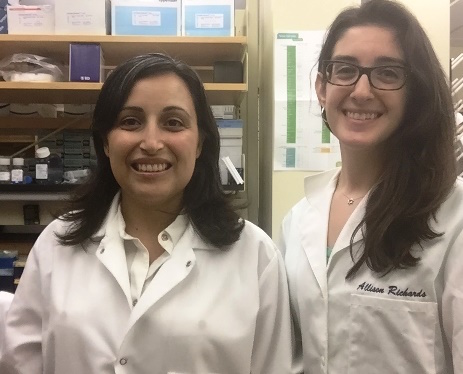
Researchers in the Center for Molecular Medicine and Genetics at the Wayne State University School of Medicine have developed a novel approach to studying host-microbiome interactions, the first step toward learning the cause-and-effect relationship between the microbes that live in our gut and our gut cells using a functional genomic approach.
The new experimental method allows researchers to identify the changes in human gene expression in cells of the colon that are determined by the presence of the microbiome. They also can determine whether these changes will be the same across individuals or may differ depending on an individual DNA sequence. The human gut microbiome, which is the community of microorganisms living in our gastrointestinal tract, plays an important role in human health and disease, but current science lacks specific information on the causal effect of the microbiome on humans.
"We know for example that specific gut microbiome taxa are associated with obesity in humans, but we don't know if they contribute to causing obesity or if instead they live preferentially in the gut of obese individuals. Essentially, we don't know how the microbes in the gut affect the human cells they interact with," said Assistant Professor of Molecular Medicine and Genetics and of Obstetrics and Gynecology Francesca Luca, Ph.D., who co-led the study with Ran Blekhman, Ph.D., assistant professor of Genetics, Cell Biology, and Development at the University of Minnesota.
Clinically, manipulating the microbiome - through fecal microbiome transplants for example - is emerging as a new treatment area. Identifying which disease mechanisms are modulated by specific microbiome taxa could lead to therapies that target both sides of the interaction.
"In the upcoming world of personalized genomics, collecting information on an individual genetic and microbial makeup can then be matched to a specific therapeutic strategy with the highest chance of success," Dr. Luca said. "This opens a large avenue of future studies that will be able to precisely discriminate causes and effects in the interaction between our cells and our microbes."
"Genetic and transcriptional analysis of human host response to healthy gut microbiota" is published in the current issue of mSystems, an open access journal of the American Society of Microbiology. (Read the article at http://msystems.asm.org/content/1/4/e00067-16).
The idea for the novel system was born out of informal conversations between Drs. Luca and Blekhman at a scientific meeting in 2014. Dr. Luca and WSU Assistant Professor of Molecular Medicine and Genetics and of Obstetrics and Gynecology Roger Pique-Regi, Ph.D., had already developed a high-throughput approach to profile the gene expression response to a large number of treatments through RNA-sequencing. At the same time, Dr. Blekhman had developed an interest in understanding how host genetics influences microbiome composition.
"Through those conversations we reached the understanding that to bring the study of host-microbiome interactions to a level beyond association analysis and to really understand how the microbiome can affect human cells and at the same time see how the DNA sequence in those cells influences their response, the fields of functional genomics and human microbiome studies had to come together," Dr. Luca said.
The work was partially funded by the American Cancer Society Institutional Research Grant (124166-IRG-58-001-55-IRG53) and the Randy Shaver Cancer Research and Community Fund to Dr. Blekhman; and by the National Institutes of Health's National Institute of General Medical Sciences (R01GM109215) to Drs. Luca and Pique-Regi.
In addition to Dr. Pique-Regi's work on the study, Allison Richards, Ph.D., a postdoctoral scholar in the Luca lab, was in charge of the functional genomics analyses, and Michael Burns, Ph.D., a postdoctoral fellow in the Blekhman lab, was in charge of the microbiome analysis. Luca lab manager Adnan Alazizi, M.S., performed the experiments. University of Montreal Assistant Professor of Biochemistry and Molecular Medicine Luis Barreiro, Ph.D., also collaborated.
The study team is now applying the method to further studies. Members recently submitted a proposal for a grant aimed at studying host-microbiome interactions in obesity and plan to extend the novel approach to organoid cultures, which more closely resemble the 3D structure of the human gut, Dr. Luca said.
For more information on the Luca laboratory, visit www.lucalab.wayne.edu.